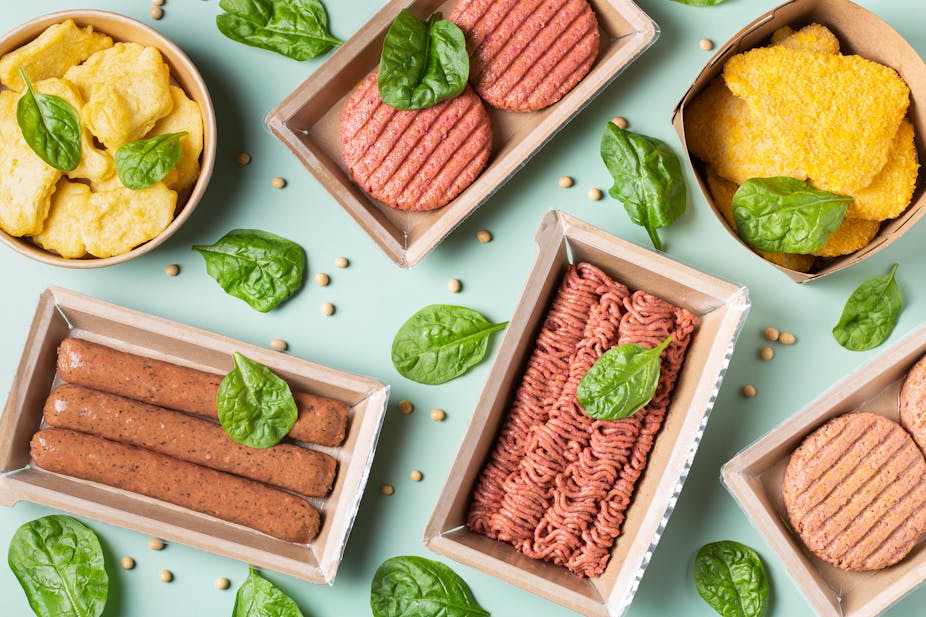“Cast a vote for a greener planet, lower food bills, better health and kindness to animals. And you don’t even have to wait for a general election,” states the global Veganuary campaign that encourages people to eat plant-based throughout January.
Transforming the world’s food system through large-scale reduction in meat production is essential if we are to preserve the planet’s natural ecosystems. But I don’t believe Veganuary’s solution is the way to do that.
While the switch to eating vegan food may seem empowering, it places an unrealistic pressure upon consumers to drive the shift to plant-based foods. By failing to highlight the state-backed corporate power at the heart of the food system, Veganuary arguably disempowers its followers.
In collaboration with Charis Davis, MA student in development studies at SOAS University of London, I researched the ownership structure and marketing strategies of several plant-based food companies. We found that many brands that are celebrated for sustainable plant-based food production are owned by giant meat and dairy companies implicated in allegations of large-scale environmental destruction.
Take Vivera, a pioneer in plant-based food. The Dutch company produces a wide range of vegetarian and vegan food, such as vegan hot dogs, plant salmon fillets, Tex Mex strips and vegan steak. The Vivera website suggests that consumers should buy vegan products to “make a huge difference for human health and the wellbeing of the planet” and states that “you can improve the world with every bite you take by eating plant-based foods”.
However, Vivera’s online marketing and product packaging do not highlight to consumers that it is owned by JBS, the world’s largest meat producer. Every day JBS’s global operations slaughter 8.7 million birds, 92,600 hogs and 42,700 head of cattle, according to the Institute for Agriculture and Trade Policy, a US-based thinktank.
JBS’s purchase of Vivera in 2021 does not signify a move away from meat. Shortly after acquiring the plant-based food company, it announced plans to invest US$130 million in two of its US beef processing plants, to increase cattle slaughtering capacity by around 300,000 a year. JBS is the biggest purchaser of cattle from the Amazon, and therefore a major contributor to deforestation.
Another case in point is Alpro. The well-known manufacturer of vegan dairy products was bought by Danone in 2017 in response to the growing popularity of milk alternatives. But the language on Alpro’s website, for example “doing your bit with every bite or sip”, seems at odds with Danone’s claims to be the number one leading brand worldwide for fresh dairy products.

Cow’s milk creates three times more greenhouse gas emissions, uses ten times as much land and twice as much freshwater than plant-based alternatives, according to calculations by the website Our World in Data.
While Danone is expanding into the plant-based market, this does not imply a retreat from its core dairy product lines. As one food industry newsletter put it: “The company … is looking to cross-promote its plant-based and traditional dairy beverages to households where individuals dabble in both categories.”
Both cases exemplify a broader trend where giant meat and dairy-based conglomerates, including JBS and Danone, are buying up smaller plant-based food companies as part of their corporate expansion strategies, according to a 2022 report by IPES-Food, a coalition of food system experts.
At present, meat and dairy producers are supported by mega state subsidies. In the EU and US, livestock farmers receive about 1,000 times more subsidies than plant-based and cultivated meat producers.
Yet Veganuary’s apolitical stance ignores the support the meat and dairy industries receive from rich-country governments. While the planet desperately needs a major shift away from meat production and consumption, mega food corporations probably won’t be the ones to lead the transition to a greener planet.
How to support plant-based food production
A significant step change would require governments to do at least three things. First, they should impose hefty fines upon and potentially confiscate the land of corporations that damage the environment through meat and dairy production.
Second, governments should reorient subsidies into plant-based food production instead of supporting agro-industrial meat production. Third, they should expand public welfare to help cash-strapped consumers to buy plant-based products.
Such moves may seem farfetched, but in the context of the existential threat of climate breakdown, they are arguably quite moderate. However, success requires strong political leadership, something that has been sidelined by Veganuary’s celebration of consumer power.
We urgently need to channel the growing public awareness of the environmental damage wrought by the current food system, through voting and large-scale social movements, into a political force that paves a way forward for genuinely climate-friendly diets.
In response to the issues raised by this article, a spokesperson for Danone said: “At Danone, we stand by the fact that both dairy and plant-based foods can contribute to a healthy sustainable diet. With many more people choosing to diversify their food choices, our portfolio allows us to provide a wide range of dairy and plant-based options to best meet their different needs and inspire healthy and sustainable choices in both categories.”
Veganuary and JBS were both approached for comment but no response has been received.

Don’t have time to read about climate change as much as you’d like?
Get a weekly roundup in your inbox instead. Every Wednesday, The Conversation’s environment editor writes Imagine, a short email that goes a little deeper into just one climate issue. Join the 30,000+ readers who’ve subscribed so far.

